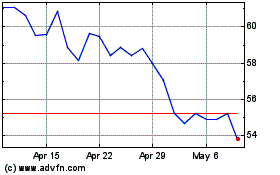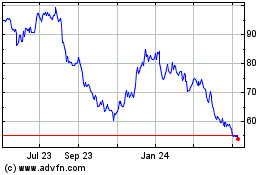End Of Burger King Deal Eases Discounting Pressure Slightly
April 16 2010 - 4:56PM
Dow Jones News
The fast-food industry could get some relief from a punishing
stretch of discounting as Burger King Holdings Inc. (BKC) next week
winds down its much-debated $1 double cheeseburger deal.
The move hardly signals an end to the $1 wars among the
fast-food burger chains, as Burger King, while raising the double
cheeseburger to $1.19, will add the Buck Double--a similar sandwich
with one slice of cheese instead of two--to its menu for $1.
McDonald's Corp. (MCD) is also still touting low-priced products,
including a newly launched Dollar Menu at breakfast.
Still, Burger King's transition will mark the beginning of the
end of the what its executives call the chain's longest and most
aggressive push on value in the past decade. Outside of Burger
King's walls, the end of the deal has the potential to ease some of
the pressure that discounting has had on the space.
"It's a small baby step, but it's moving in the right direction
toward less discounting," Deutsche Bank restaurant analyst Jason
West said. "Hopefully, the rest of the industry will move in this
direction as well."
The $1 double cheeseburger deal was a hot topic among analysts
and investors who scrutinized how it would impact traffic, sales
and margins. Burger King's initial boost of nearly double-digit
customer traffic growth eventually waned, though the company says
it helped improve its value position in the eyes of customers.
Undeniably, the deal shook up fast food, as the number of
customers buying off of burger chain's dollar menus rose 11%
between October and December of last year, after falling the
previous three quarters, said NPD Group Inc. restaurant analyst
Bonnie Riggs.
Some fast-food chains hit hardest by Burger King's promotion
were marking their calendars to coincide with the deal's end,
hoping it could spell an end to their woes.
Linda Lang, CEO of Jack in the Box Inc. (JACK), said last month
that the competitive environment in fast food wouldn't improve
until Burger King's deal ends. Jack in the Box, whose target
customer base overlaps with Burger King, said it expects its
same-store sales to fall up to 10% in its latest quarter, in part
due to competitive discounting.
One area where Burger King may see some more immediate reaction
is among its franchisees, many who have complained that they lose
money when selling the double cheeseburger for $1. The Buck Double,
with one less slice of cheese, saves about a nickel in food costs,
while raising the price of the double cheeseburger to $1.19 creates
a better margin on that product.
"We're relived that there's a more profitable product on the
dollar side, relieved that it's evolving," said one Burger King
franchisee, who declined to be named.
While the deal will end, a lawsuit sparked by the promotion
remains pending. The issue over the lawsuit, filed in November,
involves whether Burger King can set a maximum price at which
franchisees must sell a product. Burger King argues that
franchisees must comply with its value menu program, which includes
selling products for $1.
Other fast-food chains were pleased to watch from the sidelines
as the burger players compete over low prices.
"I'm happy to have them fight a burger war," Cheryl Bachelder,
chief executive of AFC Enterprises Inc. (AFCE), which owns the
Popeyes fast-food chain, said in a recent interview. "We're happy
to sell chicken."
-By Paul Ziobro, Dow Jones Newswires; 212-416-2194;
paul.ziobro@dowjones.com
Jack in the Box (NASDAQ:JACK)
Historical Stock Chart
From Mar 2024 to Apr 2024

Jack in the Box (NASDAQ:JACK)
Historical Stock Chart
From Apr 2023 to Apr 2024
